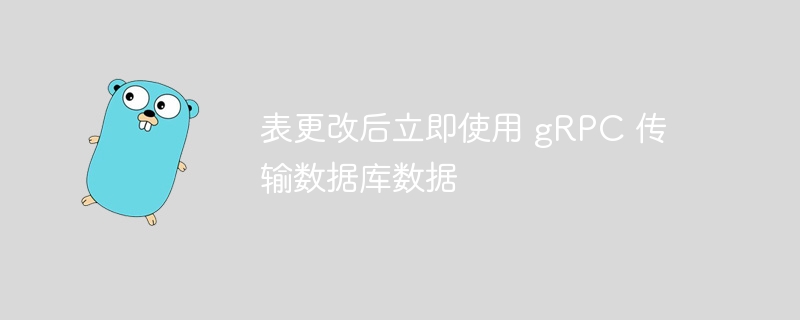Home >Backend Development >Golang >Use gRPC to transfer database data immediately after table changes
Use gRPC to transfer database data immediately after table changes
- WBOYWBOYWBOYWBOYWBOYWBOYWBOYWBOYWBOYWBOYWBOYWBOYWBforward
- 2024-02-05 11:49:31561browse

Question content
I am making a task list using go, grpc and postgres.
How to automatically stream data when calling postitem to insert new data? Do I need to subscribe to postgres or can this be done without a subscribe or publish subscribe?
//protobuf architecture
syntax = "proto3";
package tasklist;
import "google/protobuf/empty.proto";
service todolist {
rpc gettasks(google.protobuf.empty) returns (stream gettasksresponse) {}
rpc postitem(postitemrequest) returns (posttaskrequest) {}
}
message task {
int64 id = 1;
string name = 2;
}
message gettasksresponse {
task task = 1;
}
message posttaskrequest {
task task = 1;
}
message postitemresponse {
bool result = 1;
}
// postgres table structure
create table task ( id integer not null primary key, name varchar(10) not null );
// continue
func (s *server) GetTasks(_ *empty.Empty, stream pb.TaskList_GetTasksServer) error {
// How can I steam data as soon as `PostTask` is called to update db? <- <-
for _, r := range s.requests {
// stream data
}
}
func (s *server) PostTask(ctx context.Context, r *pb.PostTaskRequest) (*pb.PostTaskResponse, error) {
// update Postgres here
return &pb.PostItemResponse{Result: true}, nil
}
Correct answer
I guess s.requests is similar to chan task. So after successfully // update postgres here you can send your request in chan.
func (s *server) PostTask(ctx context.Context, r *pb.PostTaskRequest) (*pb.PostTaskResponse, error) {
postTask := toDomain(r)
err := s.service.UpdateTask(ctx, postTask)
if err != nil {
return nil, status.Error(codes.Internal, err.Error())
}
s.requests <- postTask
return &pb.PostItemResponse{Result: true}, nil
}The above is the detailed content of Use gRPC to transfer database data immediately after table changes. For more information, please follow other related articles on the PHP Chinese website!
Statement:
This article is reproduced at:stackoverflow.com. If there is any infringement, please contact admin@php.cn delete
Previous article:Determine the type of interface {} value returned by a function in GolangNext article:Determine the type of interface {} value returned by a function in Golang
Related articles
See more- Why Does fmt.Printf Output \'-101\' for a Signed Integer Represented in Two\'s Complement?
- Why are HTML comments disappearing in my Go web application?
- How Can We Implement Generic Error Handling in Go Without Losing Type Information?
- How to Get the Final URL After Redirects in Go\'s `http.Client`?
- Please provide me with the article. I need the text of the article to generate a suitable question-based title.

